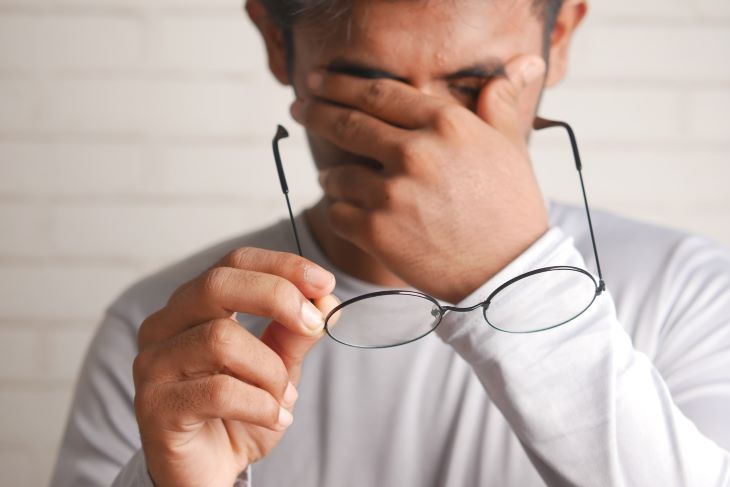Benzodiazepine Addiction
Quick Links for Benzodiazepine Addiction
- What are benzodiazepines?
- Can you become addicted to benzodiazepines?
- Why do people become addicted to benzodiazepines?
- How do benzodiazepines affect the body?
- What are the signs and symptoms of benzodiazepine addiction?
- What are the long-term risks of benzodiazepine addiction?
- Recovering from a benzodiazepine addiction
- References for benzodiazepine addiction
Benzodiazepines, also known as benzos, are a type of opioid-based drug commonly prescribed to treat a variety of medical ailments including anxiety and panic attacks.
They typically come in pill form and can only be legally obtained when prescribed by a trained medical professional.
Due to their effectiveness at relieving the symptoms of conditions such as insomnia and severe anxiety, benzodiazepines can be highly addictive and many people continue to take them even after their initial prescription has ended.
What are benzodiazepines?

Person taking benzodiazepines for addiction
Benzodiazepines are a form of sedative, and their relaxing and calming effect has led to 1.4 million adults in the UK being prescribed these drugs between 2017 and 2018. [1]
There are a number of different types of benzodiazepines prescribed in the UK, the most common being Diazepam (also known as Valium) along with Alprazolam and Lorazepam.
They can either be long-acting or short-acting and can provide fast relief with many starting to work between 30-90 minutes of ingestion.
They are legal to take in the UK when prescribed, but their addictive qualities have resulted in a dangerously high demand for illegal benzodiazepines. [2]
Benzodiazepines are classified as a Class C drug and penalties for illegal manufacture and possession range from a large fine to imprisonment.
Some people combine benzodiazepines with alcohol or other drugs – this is not recommended and can result in a fatal overdose.
However, even when they are initially prescribed in a medical setting, it’s important to remember that taking benzodiazepines is not entirely free from risk.
Can you become addicted to benzodiazepines?

Two people discussing benzodiazepine addiction
Benzodiazepines have the potential to be extremely addictive.
While not everyone who takes these drugs will become addicted, there is a higher risk of addiction when compared to non-benzodiazepine medication.
Due to this risk, it’s recommended that benzodiazepines should only be prescribed for a maximum of two to four weeks. Any longer than this can increase the chances of developing a dependency on the drug.
However, an individual who has developed an addiction to benzodiazepines may switch doctors frequently in an attempt to gain multiple prescriptions and thus increase their dosage without the knowledge of their primary physician.
If this is unsuccessful they may then go on to purchase them illegally.
One study has found that over a quarter of a million people in the UK [3] are taking benzodiazepines far beyond the recommended two to four weeks, and another study found that around 1.5 million people are struggling with an addiction to benzodiazepines.
This would make them one of the most commonly abused drugs in the UK, second only to alcohol.
Why do people become addicted to benzodiazepines?

Doctor taking notes whilst speaking with a patient about benzodiazepine addiction
Benzodiazepines are prescribed to treat a variety of medical ailments including anxiety, sleep disorders, panic attacks, seizures, and alcohol withdrawal.
They can be very effective and individuals will generally notice a fast reduction in their initial ailment – this can unfortunately lead to the desire to continue taking them in order to avoid their previous symptoms.
The drugs can have a sedative effect, creating a relaxed and often pleasurable feeling.
Long-term benzodiazepine use can change the way the brain transfers and processes information, and the person may eventually struggle to feel calm and relaxed without the drug in their system.
Often people are not aware of the risks involved when taking benzodiazepines, and as a result they do not closely monitor their intake and are more likely to take more than the recommended dose for a longer period.
How do benzodiazepines affect the body?

Man suffering from the effects of benzodiazepine addiction
Benzodiazepines work as a sedative, with their main effect primarily consisting of slowing down the body’s nervous system and reducing brain activity in certain areas.
Our brains naturally produce a chemical named Gamma Amino Butyric Acid (GABA).
This chemical slows down and reduces brain activity in the following areas:
- Memory
- Emotions
- Rational thought
- Essential functions such as breathing, blinking, and swallowing
Benzodiazepines increase the effect of GABA, [4] making the relaxed and calm sensations more pronounced.
This can decrease feelings of anxiety and allow the muscles to relax, aiding sleep and providing relief from various medical issues.
What are the signs and symptoms of benzodiazepine addiction?

Man holding his head whilst feeling the side effects of benzodiazepine addiction
While it is possible to take benzodiazepines for a genuine medical problem without becoming addicted, the risk of addiction and dependence is fairly high.
Therefore it is crucial that medical professionals are involved and alert to any potential indication of addiction, and the individual along with their family also must be made aware of the warning signs. [5]
A person who is addicted to benzodiazepines may feel that they have no control over their use of this drug, and it may seem to have spiralled to a point where their regular prescription is not having the required effect.
Even when they experience negative consequences due to their misuse of benzodiazepines, they may find that they struggle to reduce or completely stop their intake.
It can be more difficult when the drug was initially prescribed to treat a medical problem, as the individual may feel obligated to continue taking benzodiazepines in order to treat the original issue.
Benzodiazepine addiction can result in a number of physical, mental, and behavioural symptoms that can have a sweeping negative impact on every aspect of our lives.
Physical symptoms of benzodiazepine addiction
- Irritability
- Drowsiness and tiredness
- Appearing unstable on their feet
- Lack of co-ordination
- Experiencing blurred vision
- Slurring their words
- Breathing difficulties
Mental symptoms of benzodiazepine addiction
- Forgetfulness and poor memory
- Mood swings
- Feeling confused
- A craving for benzodiazepines that feels intense and almost uncontrollable
Behavioural symptoms of benzodiazepine addiction
- Switching doctors frequently in order to obtain multiple prescriptions
- Asking family, friends, or colleagues for their benzodiazepine pills
- Engaging in risky behaviours, such as driving a car when under the influence of benzodiazepines
- Making poor decisions and judgments
- Lowered inhibitions
- A desire to increase the amount of the drug taken, or take it more frequently
- Taking benzodiazepine with alcohol or other drugs
What are the long-term risks of benzodiazepine addiction?

Therapist and patient discussing a treatment plan for benzodiazepine addiction
Abusing benzodiazepines long-term on a regular basis can result in the brain becoming dependent on them, and eventually, it may not be able to function properly without regular ingestion of the drug.
This can lead to serious long-term issues [6] that affect a person’s health, relationships, and general well-being.
They may also combine benzodiazepines with alcohol and other drugs, increasing the likelihood of long-term effects and risking a serious overdose that could prove to be fatal.
Long-term risks of benzodiazepine addiction
- Problems in relationships with family, friends, and colleagues
- Hallucinations
- Low blood pressure
- Dementia
- Severe depression can lead to suicidal thoughts
- Anxiety
- Inability to fall asleep or stay asleep
- Financial difficulties – debts to loan companies or family and friends, having little to no savings
- Seizures
Any one of these long-term effects can have a severely debilitating impact on a person’s quality of life.
If you’re concerned that you or someone you know is struggling with benzodiazepine addiction, act quickly and reach out for help today.
Recovering from a benzodiazepine addiction

Two people holding hands and talking about benzodiazepine addiction
Due to the physically addictive qualities of benzodiazepines, an improperly managed withdrawal can be life-threatening or even fatal. [7]
It is highly recommended that professional medical guidance is sought when attempting to recover from benzodiazepine addiction.
Withdrawal from a benzodiazepine addiction involves a period of detoxification, during which the drug will begin to leave the body.
This can result in a number of symptoms, some of which are merely uncomfortable (such as a ringing in the ears) and others that can be dangerous (such as seizures).
Due to the variety of potential symptoms, detoxification should be undertaken in a dedicated medical setting.
The type of benzodiazepines involved in the addiction will determine how quickly the withdrawal symptoms will appear.
If the addiction is to a short-acting drug, intense symptoms can appear as early as six to eight hours after the last ingestion.
If the drug is a long-acting benzodiazepine, less intense symptoms can present within 24-48 hours.
Full withdrawal and recovery from a benzodiazepine addiction typically take around 6-18 months, but some studies have found that in extreme cases it can take at least three or four years.

Group therapy session for benzodiazepine addiction
Benzodiazepine addiction withdrawal symptoms
Withdrawal from an addiction to benzodiazepines can involve a number of potential symptoms. [8]
These include:
- Excessive perspiration
- Sudden weight loss
- Feeling depressed
- Hallucinations and/or delusions
- Heart palpitations
- Insomnia or disturbed sleep, having nightmares
- Feeling nauseous
- Anxiety and panic attacks
- Feeling as though you have the flu
- Irritability
- Ringing in the ears
Recovery from benzodiazepine addiction is not easy, but the decision involved in taking the first step is a highly commendable one.
While the process can be long and slow, it can be comforting to remember that thousands of formerly addicted people are now living happy and fulfilled lives free from the immense weight of benzodiazepine addiction.
Our team can help you find a rehabilitation program that is right for you. Get in touch today and take that first step on the road to recovery.
References for Benzodiazepine Addiction
[2] https://bpspubs.onlinelibrary.wiley.com/doi/full/10.1111/bcp.14397
[3] https://bjgp.org/content/67/662/e609
[4] https://www.ncbi.nlm.nih.gov/pmc/articles/PMC3684331/
[5] https://www.webmd.com/mental-health/addiction/benzodiazepine-abuse
[6] https://www.ncbi.nlm.nih.gov/pmc/articles/PMC10309976/
[7] https://pubmed.ncbi.nlm.nih.gov/7841856/






